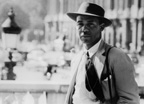






| Ralph
Ellison: An American Journey
Ralph Ellison: An American Journey locates the origins of Ralph Ellison's artistic and intellectual aspirations in his upwardly mobile family who left the South for the relative racial fluidity of the newly ratified state of Oklahoma and named their son after poet Ralph Waldo Emerson. Ellison attended Tuskegee Institute on a music scholarship, but he found himself increasingly drawn to modernist literature and writing. He would later fuse elements of Eliot, Hemingway and Black folklore in the dizzying style of the jazz that he played and loved. After Ellison moved to New York, he associated with the Federal Writers Project and became a protegee of Richard Wright, who encouraged him to choose writing over music. After publishing short stories, articles and reviews, Ellison typed the words ďI am an invisible manĒ and began the seven-year journey that paid off in his masterpiece. This richly symbolic, ironic, and often surreal novel describes a quest much like Ellisonís own to invent an identity independent of that imposed by society. Winner of the 1953 National Book Award, Invisible Man thrust Ellison not only into prominence but also into the vortex of the battles raging over the role of literature and art in politics, and specifically over Ellison's rejection of the "protest novel." Black Arts activists of the 1960s and 1970s condemned Ellisonís integrationist stance and "disengaged voice." In Ralph Ellison: An American Journey, Cornel West, Amiri Baraka, Stanley Crouch, Terrance Rafferty and other cultural critics, reconstruct those debates and discuss the roles and responsibilities of a ďNegro writer." Ellisonís responses to his critics are collected in the essays in Shadow and Act and Going to the Territory. He held that American Blacks and whites, whether they know it or not, are entwined in building a common national experience. Perhaps it was the difficulty of achieving such a synthesis that led to Ellison's famous struggle on his never completed second novel, Juneteenth, published only after his death. In the film, friends and critics discuss the book, but itís a poignant reading by Toni Morrison that brings the novel to startling life. Ralph Ellison: An American Journey explores the many ways one of our most important writers and thinkers grappled with the question: "What does it mean to be an American?" |
"We are, reader
and writers alike, buoyed and challenged by wave upon brilliant wave
of Ellison's artistry. His essays and his masterpiece of a novel represent
achievements like no others in the history of American literature." "A richly layered
portrait of Ralph Ellison and a sensitive examination of the relationship
between race and Ellison's artistic aesthetic. The dramatized scenes
from Invisible
Man become
strong visual reminders of the book's ferocity and beauty." "The documentary
honors the complicated spirit of the book and its creator." "A thoughtful,
stirring documentary. The great thing about this heartening program
is that Ellison's work strands as a great work of art." "Whether black folk are in or out of style, Invisible Man always will be valuable in interpreting the trends that silhouette black life." --Michael Eric Dyson, DePaul University "This documentary
is convincing evidence that the author succeeded magnificently in teaching
many Americans, black and white alike, to understand and even to love
the multiracial, "jazz shaped" nature of their culture." "Ralph
Ellison: An American Journey
goes a long way toward reclaiming and resurrecting the vitality and
relevance of Invisible
Man - and
introducing a new audience to the complex man behind the book." "The documentary,
like Ellison himself, is a poignant almost irritating reminder of our
nation's unhealed internal wounds." "This video,
a well-crafted portrait of a man whose life, works, and historical importance
to 20th century American literature clearly deserves recognition, would
be a good choice for school and public libraries." "Highly recommended."
Producer/Writer/Director:
Avon Kirkland 2001, 87 minutes A production of New Images Productions, Inc., in association with Thirteen/WNET New York Co-presented by the National Black Programming Consortium and ITVS Major funding provided by the National Endowment for the Humanities
|
 Ralph
Ellison: An American Journey is the first documentary on one of
the most gifted and intellectually provocative authors of modern American
literature. It establishes Ellison as a central figure in contemporary
debates over art, politics, race and nationhood. Narrated by Andre Braugher,
the film brilliantly presents the first scenes ever filmed from Ellison's
landmark novel, Invisible Man.
Ralph
Ellison: An American Journey is the first documentary on one of
the most gifted and intellectually provocative authors of modern American
literature. It establishes Ellison as a central figure in contemporary
debates over art, politics, race and nationhood. Narrated by Andre Braugher,
the film brilliantly presents the first scenes ever filmed from Ellison's
landmark novel, Invisible Man.